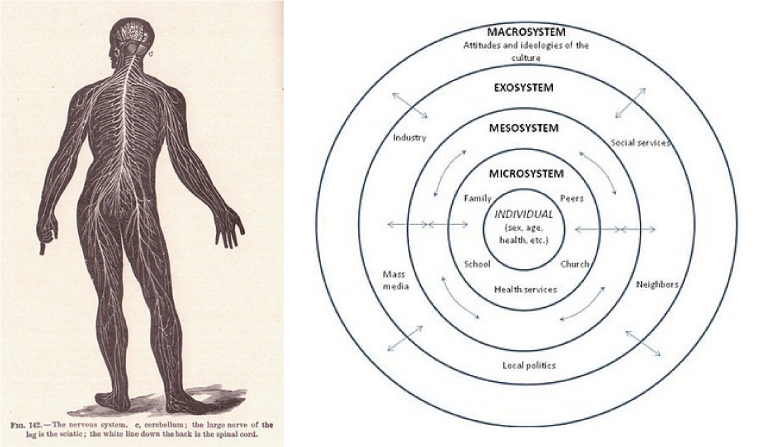Chapter 2. Introduction to Major Perspectives
2.5 Chapter Summary
Jennifer Walinga
There are many different ways to think about human experience, thought, and behaviour. The multiple perspectives in modern psychology provide researchers and students a variety of ways to approach problems and to understand, explain, predict, and resolve human thought and behaviour.
Perhaps the field of psychology struggles to find a unifying paradigm because human beings are so multifaceted, and human experience so diverse and complex. As with many areas of life, psychology is perhaps best understood through its complexity: psychology seems to move between poles and require a dialectical examination. Human beings are complex systems living within complex adaptive systems (Figure 2.17), possessing multiple ways of knowing and learning and therefore requiring multiple perspectives in order to shed light on the meaning of any one human experience.

The greatest challenge of modern psychology may be holding the whole of human system experience in our minds – biology, cognition, emotion, and belief over time and within an environment and culture – and distilling an understanding from the complex interactions of so many factors.
Image Attributions
Figure 2.17: body by Sue Clark (http://commons.wikimedia.org/wiki/File:Page_214_Nervous_System.jpg) is in the public domain; bullseye from Wikipedia (http://en.wikipedia.org/wiki/Ecological_systems_theory) used under a CC-BY-SA license 3.0 Unported license (http://creativecommons.org/licenses/by-sa/3.0/).
Long Description
Figure 2.17 long description: The individual is surrounded by multiple systems which exercise influence on the individual.
- An individual’s sex, age, health, etc.
- Microsystem: Family, peers, church, health services, school.
- Mesosystem.
- Exosystem: Social services, neighbours, local politics, mass media, industry.
- Macrosystem: Attitudes and ideologies of the culture.

